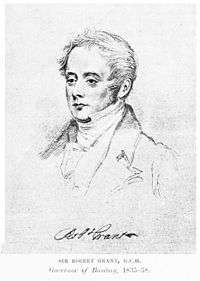Robert Grant (MP)

Sir Robert Grant GCH (1779–9 July 1838) was a British lawyer and politician.
Life
Robert Grant was born in India, the son of Charles Grant, chairman of the Directors of the Honourable East India Company, and younger brother of Charles Grant, later Lord Glenelg. Returning home with their father in 1790, the two brothers were entered as students of Magdalene College, Cambridge, in 1795. In 1801 Charles was fourth wrangler and senior Chancellor’s medallist; Robert was third wrangler and second Chancellor’s medallist.[1] (The
Grant was called to the bar the same day as his brother, 30 January 1807, and entered into legal practice, becoming King’s Sergeant in the Court of the Duchy of Lancaster, and one of the Commissioners in Bankruptcy. He was elected Member of Parliament for the Elgin Burghs in 1818, and for the Inverness Burghs in 1826. The latter constituency he represented for four years. In 1830 and 1831, he was returned for Norwich, and in 1832 for Finsbury. He advocated for the removal of the disabilities of the Jews, and twice carried bills on the subject through the House of Commons. They were, however, rejected in the Upper House, which did not yield on the question until 1858, twenty years after Grant’s death. In 1832 he became Judge Advocate General, and in 1834 was appointed Governor of Bombay and GCH. He died at Dapodi, near to Poona on 9 July 1838.[2]
Works
In his younger days Grant published an essay on the trade and government of India, and a sketch of the early history of the British East India Company. He was the author of a volume of sacred poems, which was edited and published after his death by his brother, Lord Glenelg. This volume includes some hymns; his best known hymn is "O Worship the King", based on Psalm 104.
Legacy
Grant Medical College, the oldest medical college in Mumbai, India, is named after Robert Grant, as are Grant Road and Grant Road Station in the same city.
Family
Grant married Margaret, only daughter of Sir David Davidson of Cantray, with issue two sons and two daughters:
- Sir Charles Grant, K.C.S.I, formerly a Member of Council in India;
- Colonel Robert Grant, R.E., Deputy Adjutant General;
- Sibylla Sophia, married to Granville Ryder, Esq.; and
- Constance Charemile, who died in childhood.
Ten years after his death, Margaret married Josceline Percy, second son of the Earl of Beverley, with issue one son, George Algernon, born in 1849, who later became Capt. and Lt. Col. of the Grenadier Guards.
References
- ↑ "Grant, Robert (GRNT795R)". A Cambridge Alumni Database. University of Cambridge.
- ↑ Kulkarni, Sumitra (1995). The Satara Raj, 1818-1848: A Study in History, Administration, and Culture. Mittal Publications. p. 27. ISBN 978-8-17099-581-4.
Attribution
![]() This article incorporates text from a work in the public domain: The Northern Highlands in the nineteenth century (1907) by James Barron
This article incorporates text from a work in the public domain: The Northern Highlands in the nineteenth century (1907) by James Barron
External links
- "Note B: The Anglo-Indian Grants: Charles Grant", Appendix, The Northern Highlands in the Nineteenth Century, Electric Scotland
- Hansard 1803–2005: contributions in Parliament by Robert Grant
- "Archival material relating to Robert Grant". UK National Archives.
- Hansard 1803–2005: contributions in Parliament by Robert Grant
- Works by or about Robert Grant at Internet Archive
- Works by Robert Grant at LibriVox (public domain audiobooks)

| Parliament of the United Kingdom | ||
|---|---|---|
| Preceded by Patrick Milne |
Member of Parliament for Elgin Burghs 1818–1820 |
Succeeded by Archibald Farquharson |
| Preceded by George Cumming |
Member of Parliament for Inverness Burghs 1826–1830 |
Succeeded by John Baillie |
| Preceded by William Smith Jonathan Peel |
Member of Parliament for Norwich 1830–1832 With: Richard Hanbury Gurney |
Succeeded by Viscount Stormont Sir James Scarlett |
| New constituency | Member of Parliament for Finsbury 1832–1834 With: Robert Spankie |
Succeeded by Thomas Slingsby Duncombe Robert Spankie |
| Legal offices | ||
| Preceded by Sir John Beckett |
Judge Advocate General 1832–1834 |
Succeeded by Robert Cutlar Fergusson |
| Political offices | ||
| Preceded by The Earl of Clare |
Governor of Bombay 1835–1838 |
Succeeded by Sir James Rivett-Carnac |